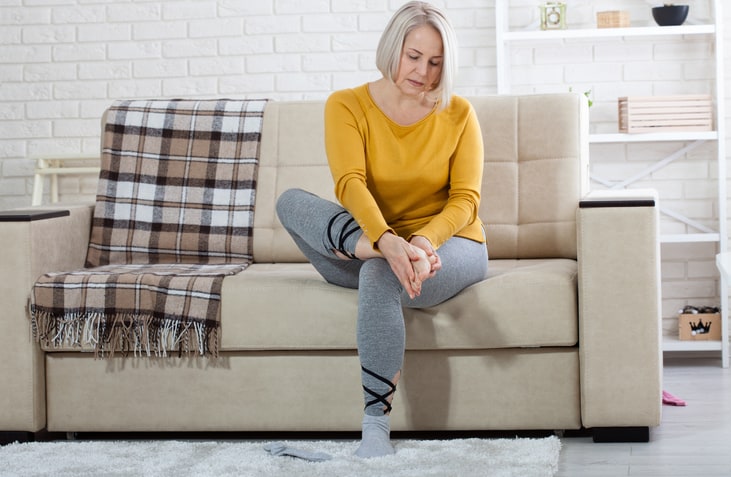Do you enjoy walking around your house in bare feet or just socks? Unfortunately, you may be putting strain on the tendons in your feet and increasing the risk of injury.
More Americans work from home than ever before, but proper footwear is still essential. Selecting appropriate at-home footwear is just as important as choosing supportive shoes for outdoor walking and other activities. In addition, caring for your feet can help prevent chronic foot pain and conditions like tendonitis and plantar fasciitis.
Importance of Supportive, Indoor Footwear
Going barefoot or wearing slippers may sound comfortable, but these footwear practices have increased the number of patients experiencing foot pain and making appointments with orthopedists. Hardwood and tiled floors tend to cause more foot problems because these surfaces have very little give. Carpeting is better, but the feet still experience impact.
It is not necessary to wear athletic shoes around the house, but even a pair of house shoes can make a significant difference by providing support and structure to the feet.
“All kinds of footwear protect your feet. Over the course of weeks or months, the strain of walking barefoot can add significant stress to your arches, tendons, plantar fascia and joints,” explains Sean Peden, MD, a Yale Medicine orthopedic foot and ankle specialist. “This can lead to a range of complications, from minor conditions such as calluses to major issues such as arch collapse” (Medical Xpress).
Dr. Peden encourages wearing a hard-soled slipper without laces or a hard-soled clog. A rigid sole acts as a shock absorber and minimizes stress on tendons and joints in the foot. A fluffy slipper is an unwise choice for home footwear because it does not provide any support.
Indoor Footwear Can Help Prevent Common Foot Conditions
Choosing a hard-soled house shoe with a wide forefront can help prevent common foot conditions like the following:
Hammertoes and bunions — The feet naturally pronate during walking, making the foot arch collapse. Walking barefoot on hard surfaces can cause prolonged pronation and cause foot deformities like bunions and hammertoes.
Posterior tibial tendonitis, or shin splints — Prolonged periods of collapsed foot arch can make the posterior tibial tendon stretch excessively, and this can cause pain, swelling and instability in the tendon.
Plantar fasciitis — The plantar fascia absorbs stress and supports the foot arch. Standing for extended periods or wearing non-supportive shoes can create small tears in the band of tissue and cause inflammation and irritation on the bottom of the foot.
Time to Make an Appointment With an Orthopedist? If you have had persistent foot pain, it’s time to make an appointment with your orthopedist. There may be a simple solution to your foot pain, or you may need a surgical procedure to get relief. Call today and get permanent relief from your foot pain.

